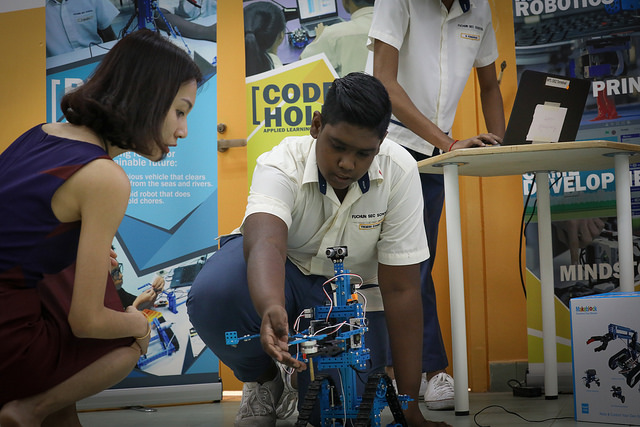Which toothpaste has the best whitening effects? Should you use baking soda or baking powder to bake your cake? Does the temperature of water affect how it sounds when it’s poured? These are curious science questions that students dive into at Sembawang Secondary School’s Science Research Programme.
Accessible by all Secondary 1 to 3 students, the open inquiry model – where no question is too silly – allows students to satisfy their curiosity. With the scientific approach, guidance from teachers, and lots of perseverance, the students test and find answers to their chosen research questions.
If you’d like to learn the answers to the above questions for yourself, read on.
1. Which raising agent makes the softest cake?
.jpg)
Students meticulously preparing the ingredients for their experiments.
“Our team enjoys baking and we observed that different recipes called for different raising agents, but weren’t sure why,” says Kaushikashree Tamilko, Secondary 4 this year. Together with her teammates, Onyekaba Regina, Gonzago Pamela Malar, and Syed Leerun Raizal Al-Edrus, they had set out to gain a deeper understanding of raising agents such as baking powder.
With some research, they learnt that the type of raising agents used in baking can affect the density, springiness and firmness of cakes. Their experiments studied these three variables and four different types of raising agents: single-acting baking powder, double-acting baking powder, a mixture of both, and baking soda.
Their results: The cakes they baked with double-acting baking powder were significantly springier, softer, and less dense than other cakes.
“I wanted to present science in an unconventional way, so I decided to find out how food and science work together,” says Regina. “It was a whole new world to me! Scientific research is laborious. My team and I had to repeat the baking process in precisely the same way more than 20 times, but vary the rising agent used.”

Kaushikashree (left) and Regina (right), proudly brandishing their trusty lab equipment.
Kaushikashree also recounts having to stay back after classes to conduct their experiments. Despite these less glamorous parts of the process, both students found the time to be well-spent. Values such as patience and perseverance were put to practise, says Kaushikashree, and Regina found comfort in the camaraderie that spurred them on.
2. Which toothpaste brand makes our teeth whiter?
.jpg)
Students carrying out their egg-citing experiment.
We’ve seen the commercials: every other toothpaste brand claim that four out of five dentists recommend them. But is it true? Secondary 3 students Shereen Gandarosa, Xenson Eng, Sven Low, and Priyanka Babu took it upon themselves to investigate.
More specifically, their project looked at which brand of toothpaste is more effective at whitening teeth. Because eggshells and human teeth have similar chemical compositions, eggshells were immersed in different solutions of coke, fruit juice, coffee, and distilled water for six hours. Then, using an electric toothbrush, a small area of the eggshell was brushed with one of four toothpaste brands the group was testing.
“The project allowed me to see how Science can be used to determine the effectiveness of an everyday item that we take for granted,” says Shereen, on how the investigation made her more aware of what to look out for in an effective toothpaste.

Xenson Eng (left) and Shereen Gandarosa (right)
Xenson echoes her sentiment: “After finding out that more expensive toothpastes may not give me whiter teeth, it made me more prudent in shopping. Working together made learning a lot more fun than if I were to venture into it alone.”
3. Does pouring cold water sound different from pouring hot water?
.jpg)
“We knew that bottles with different levels of water produce sounds of different pitch. So, I was curious to know whether the temperature of water would affect the pitch of the sound produced when water is poured into a container,” explains Secondary 4 student Fakrudin Hussaini Yafarah Taj. Last year, Yafarah and her teammates Sathish Kaushik and Chan Si Kiat endeavoured to satisfy their curiosity.
As it turns out, the work that was required for their experiment was beyond what they were taught in secondary school. But with their teachers’ guidance, they learnt new skills such as analysing scatter plots and sound frequencies for their project.
.jpg)
Yafarah and her trusty thermometer.
Their experiments didn’t turn out to be as straightforward as they had hoped for. They observed a general trend that the hotter the water, the higher the frequency of sound produced, but could not collect the data to prove it. Nevertheless, they learnt to pinpoint sources of errors and reflected on what they would do better if they tried it again – all part of the scientific process!
4. How long should you cook your vegetables to keep it nutritious?
.jpg)
Vegetables are a great source of vitamin C but a large amount of it is lost when boiled. What then is a good duration to cook your greens? Philip Lim, Niranjan Murali, Celine Lim, Celeste Lim, and Mohamed Daniel want to find out. They blended and strained green capsicum before adding distilled water and heating the solution for different lengths of time. The team then determined the amount of vitamin C in green capsicum after each heating through titration.
.jpg)
Philip and the biuret, a tool that he’s now well-acquainted with.
“I enjoyed getting to conduct a real-life investigation with friends to learn empirically how the vitamin C content of green capsicums decreases when being boiled,” says Philip, Secondary 4 this year. He also shares how they learnt that because vitamin C is water-soluble, it is quickly lost when cooked in water.
“We wanted to research on this because it’s relevant to everyday life. It’s important for us to know how to cook nutritious meals.”



8c9d7aa7a8a66eb2afccc900c73e6f2e.jpg)


